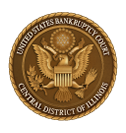This page is primarily for bankruptcy case filers who are not represented by an attorney (pro se filers) and contains information pertaining to filing at the courthouse or by mail.
Please note that the Clerk's Office is prohibited from giving legal advice or assisting you with the preparation of forms.
Bankruptcy can be complicated. The staff of the U.S. Bankruptcy Court Clerk's office provides a variety of services; however, they are not permitted to assist with the preparation of the voluntary petition, schedules, or other documents, nor can they provide legal advice. All parties must comply with the U.S. Bankruptcy Code, and the Federal Rules of Bankruptcy Procedure. Failure to do so may result in dismissal of the case, or other sanctions. It is always best to seek legal advice and representation from an attorney experienced in bankruptcy law and procedure.
The links on this page may provide information that may assist you with pro se filing and answer some of your general questions about filing for bankruptcy.
Other considerations are:
- Have you obtained your credit counseling certificate? If not, your bankruptcy case may be dismissed.
- Bankruptcy fraud is a felony under federal criminal law and may result in arrest, fine or imprisonment.
- Information on limited free (pro bono) legal counsel in central Illinois is available from this Locator for Consumers Needing Pro Bono Bankruptcy Services link. By clicking on the state within the interactive national map, you will be led to the name, location and essential details for all bankruptcy pro bono providers near them, including any critical limitations on the services provided.
How to File a Case or Document Without an Attorney:
Unrepresented individuals may submit documents for filing in several ways. They are set forth below. If a filing fee is due with your documents, payment may be made by money order or cashier’s check made payable to the Clerk of the U.S. Bankruptcy Court. Cash will only be accepted in person at the Springfield office and for the exact amount due. Under no circumstances will personal checks or credit cards be accepted.
- Documents may be submitted electronically through the Court’s Electronic Document Submission System (“EDSS”). Filers are encouraged to carefully review the EDSS policy to understand how the process works, including how the date of filing is determined and applied.
- As an alternative to submitting documents electronically through EDSS, pro se filers are encouraged to submit their filings through the mail. Documents and filing fees should be mailed to the appropriate divisional office at one of the addresses listed on the Bankruptcy Court website. If a filing fee is due with your documents, include the fee in the form of a money order or cashier’s check payable to the Clerk of the U.S. Bankruptcy Court. Do not send cash in the mail.
- Documents may also be brought to the courthouse for filing in person. For the convenience of the filer, drop boxes are located inside the doors of the courthouses and documents may be dropped off at those locations between 8 a.m. and 5 p.m., Monday through Friday, excluding holidays and other building closures. When dropping documents off at a drop box, please make sure to do the following:
- Place all documents and filing fees in a sealed envelope clearly addressed to the Bankruptcy Court. The District Court and Bankruptcy Court will be sharing drop boxes, so clearly addressing envelopes intended for delivery to the Bankruptcy Court will avoid confusion. Do not drop loose papers or checks into the drop box.
- If a filing fee is due with your documents, include the fee in the form of a money order or cashier’s check payable to the Clerk of the U.S. Bankruptcy Court. Do not include cash or a personal check with your filing.
- Regardless of what information is included on the documents to be filed, please include your name, mailing address, phone number, and email address with the filing. This will allow us to contact you if further information is needed.
